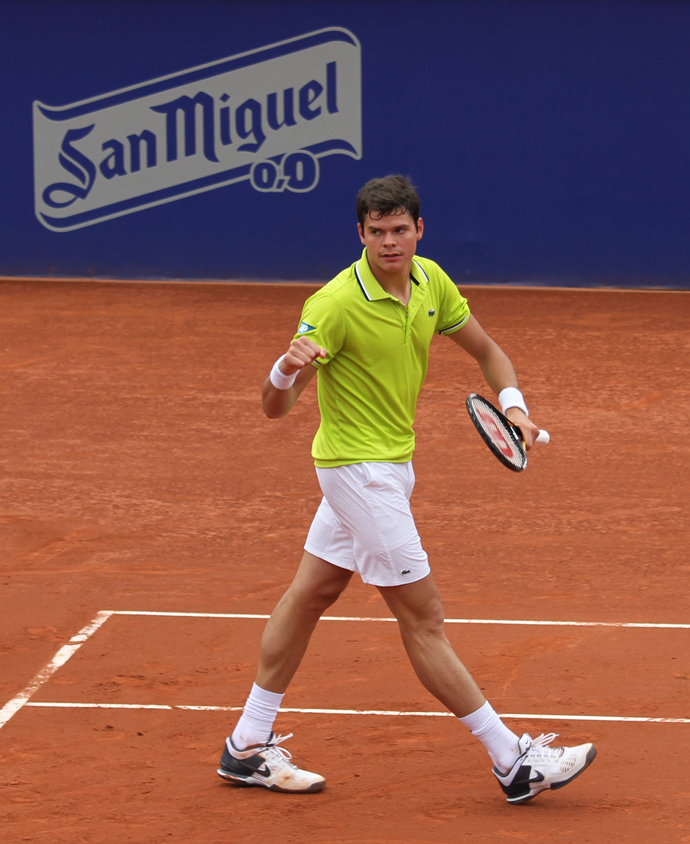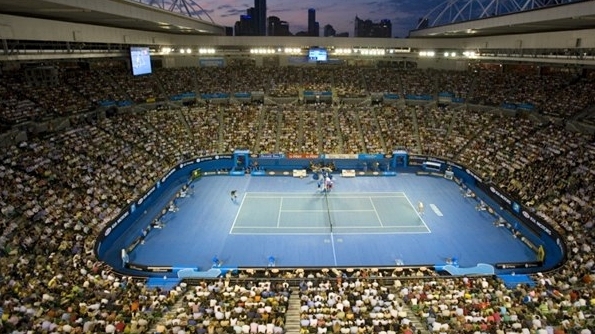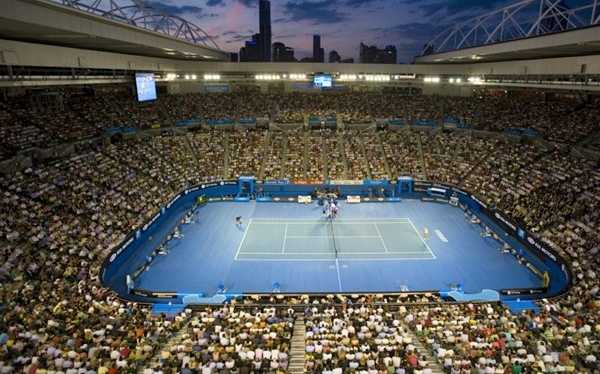In a match-scheduling pattern that is unique to the Australian Open, the finalist from the upper half of the men’s draw will have rested almost a day by the time the semifinalists from the bottom half take the court, for the right to face him for the title in the year’s first Major. That is what the thirteenth-seeded Milos Raonic and the number two player in the world Andy Murray will do on Friday.
There is no doubt that on paper, Andy Murray is the favorite to win. On the court, however, the match may play out differently. Raonic was already a monster server in the 2012-13 seasons. Then, starting midway through the 2014 season, his already-solid forehands turned into deadly weapons. About a year later, he began venturing more and more to the net because he improved his volleys to the point where he could back up with ease his big forehands at the net. If there is anything that the young 2016 season has shown us so far, Raonic has established a winning game plan based on these three elements (serve, forehand, volleys), and this plan is ready to challenge the elites of the game. He already passed the test recently against the Swiss connection, with a straight-set win over Roger Federer in the Brisbane finals, and a five-set thriller against Stan Wawrinka in the fourth round here. He now has the chance to record victories over four elite members of the game, Wawrinka, Murray, Federer, and Novak Djokovic, before even February begins. Can he? I happen to believe he can. More on that later, let’s get back to the X’s and O’s of this encounter.
One small problem for Milos: Andy’s repertoire is well-equipped to respond to the challenges that Raonic’s weapons pose. In other words, “he got game.” He returns well, defends well, passes well, and lobs well. This is why this match is so intriguing and promising. It is a contrast of styles featuring two high-I.Q. players who will adjust their tactics and modify their patterns during the course of the match depending on the circumstances.
The pattern that Murray will seek probably centers on baseline rallies in which he can force Raonic, for the most part, into going backhand-to-backhand. It would also behoove Andy to strike the ball once in a while to Raonic’s deuce side to expose the Canadian’s backhand on the next shot. However, Raonic is highly unlikely to hit more than two, maximum three, backhands with the intention of waiting for the next shot. He will most likely strike his awkward-looking, flat, down-the-line backhand that works sometimes, but one that has a low margin for error. That particular shot’s efficiency will be one of the three keys to his victory. If he can make those for the most part, Andy will have to run those down and get it back in the court to a spot where Raonic can get in position to strike his deadly forehand for the winner.
The second key to Raonic’s victory rests on how much damage he can cause when he gets a look at Andy’s second serve which remains one of the Scot’s weaknesses. The third key to beating Andy is for Milos to maintain the high velocity on his underrated second serves. They are underrated largely because his first serve is so impressive (currently one of the three best in men’s tennis with Isner and Karlovic) that his second-serve gets overlooked. Yet, it is a wonderful weapon to set up the second shot, which usually ends up being a high bouncing ball in the middle area of the court, allowing Milos once again to unleash his forehand. The Canadian must take risks on his second serves, even if it means he may double fault a couple of more times than he usually does. If he plays it safe, he will get back a deep return from Andy and will have to engage in a baseline rally. He is better off losing a few points on double faults and playing his “A” game, than sparing the double faults but being forced to get involved in numerous baseline rallies.
Andy, for his part, will rely on his footwork, his ability to hit spots on the court (the desired spot would mostly be his opponent’s backhand), and his counter-punching abilities when Milos begins his assault during rallies. He will absolutely need to put in a large amount of first serves, in order to avoid giving Milos looks on second-serve returns. One factor in Andy favor is that he has been here before, and by that I mean, in the elite stages of a Major. A persona grata in the last weekends of Majors since 2010, he will probably approach this match as another day at the office, and will already have mastered the pre-match routine for the 24 hours leading to the match. Milos has only been to the semifinals of a Major once, Wimbledon 2014. He has however been to the second week of Majors several times. Add to that his maturity level as a competitor and as an individual, I am not exactly sure how much edge Murray has over him in this category, as they step on the court Friday.
Raonic, in my opinion, is poised to take the next step, much to the dismay of those who have mocked him three weeks ago when he said that he was ready to win Majors. The fact that he is 3-3 against Murray, thus playing the one member of the sport’s elite group against whom he has the best chance to win, should add to his motivation. I have championed Milos since the tournament began, and I am sticking with him now. I am going with the upset win over Murray in 4 sets, for an opportunity to face the best player in the world on Sunday for the title.
Note: Click here to follow MT-Desk on Twitter
 2012 Barcelona Open – Raonic, seconds after he records his first victory over Murray
2012 Barcelona Open – Raonic, seconds after he records his first victory over Murray


